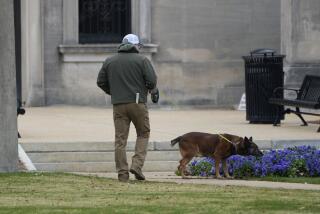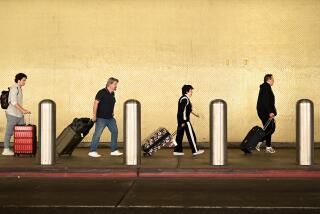Venezuela Tightens Reins After Coup Attempt
- Share via
World Travel Watch is a monthly report designed to help you make informed judgments about travel. Because conditions can change overnight, always make your own inquiries before you leave home. For more information on safety concerns in countries you may be visiting, contact the Citizens Emergency Center, U.S. Department of State, Washington, D.C. 20520, (202) 647-5225.
South America
Venezuela: The U.S. State Department reports that travel and security conditions in Venezuela are returning to normal in the aftermath of the Nov. 27 coup attempt in the capital city of Caracas, when rebellious units of the air force tried to overthrow the government of President Carlos Andres Perez. At least 169 people have died and hundreds more were wounded. A 10 p.m.-5 a.m. curfew remains in effect, and constitutional guarantees of personal freedoms have been suspended. Travelers should adhere strictly to the curfew and obey instructions from uniformed authorities. Airports are open but operating on a reduced schedule due to the curfew.
Colombia: A 90-day state of emergency was announced Nov. 8 after more than 30 bombs exploded across the country in a wave of guerrilla- and drug-related violence. The emergency reflects a harder line by the government in its attempts to restore peace to the country, a position supported by both the ruling and opposition parties and by most Colombians. These developments should not have a significant impact on travel to the main tourist areas, but exercise caution if traveling here.
Asia
South Korea: National elections are scheduled Dec. 18. Travelers should exercise caution around political rallies or demonstrations.
Mediterranean
Corsica: A demonstration against French rule erupted in violence Nov. 19 in the eastern port of Ajaccio. According to a Reuters report, some 300 Corsican separatists burned cars, smashed store windows and battled police with gasoline bombs and stones in a protest against the Nov. 17 arrests of about 20 separatists for extortion attempts and a July attack on a police bus. Two bombs caused serious damage but no injuries. Corsican nationalists have attacked tourist facilities and have maintained a low-level campaign against French rule for years. Travelers should exercise caution and avoid all large gatherings.
Greece: Greece is suffering its worst drought in 20 years, and authorities have called in American rain makers hoping to avoid water rationing in Athens. According to a Nov. 12 report in The European newspaper, the government has signed a contract with a company called North American Weather Consultants, based in Salt Lake City, to seed clouds over Lake Mornos, hoping to increase the likelihood of rain by 10%-35%. The report claims that reservoirs have only about a two-month supply of water left for the capital city, and if substantial rain doesn’t fall soon, rationing will be required.
Former Soviet Republics
Russia: Troops were put on alert Nov. 19 in the northern Caucasus Mountain regions of North Ossetia and Ingushetia because attempts to disarm warring factions failed. In the nearby region of Chechenia, a state of emergency and curfew were imposed Nov. 10 due to the massing of Russian troops on the border. Travel to these regions should be avoided due to the likelihood of continuing conflict.
Tajikistan: Battles among ethnic groups have killed thousands of people in the past year, created chaos throughout the country and caused the presidency to change hands three times in the last three months. Deputy security minister Dzhurabek Aminov, a centrist who was trying to end the fighting, was assassinated Nov. 18 in the capital city of Dushanbe. The situation remains volatile and all travel here should be avoided.
Africa
Angola: Travel to Angola should be deferred until the fallout from September’s election has cleared. Jonas Savimbi, the rebel leader who lost what was considered by foreign observers to be a relatively free and fair election, initially accepted the results but has since wavered. A return to civil war is possible if his final decision is to reject the vote.
Cameroon: A three-month state of emergency is in effect in the Northwest Province due to unrest following the re-election of President Paul Biya in October. Unrest has also occurred in the regions of Douala and Yaounde, and a recent media campaign denouncing foreign diplomats has created anti-American sentiments. Banditry and petty crime are problems in urban and rural areas.
Road travel at night should be avoided, even between the international airport and downtown Yaounde. Checkpoints exist on roads throughout the country, and passports must be carried at all times. Register with the U.S. Embassy upon arrival.
Kenya: Snap elections called by President Daniel Arap Moi in an attempt to prevent opposition politicians from organizing their campaigns have been pushed back by the courts to Dec. 29. It is likely that the campaign will produce rallies and demonstrations that could become violent, so travelers should avoid all such gatherings.
Sierra Leone: Undertake travel to the eastern and southern parts of the country with caution. Avoid travel to the Kono district due to armed conflict and to Kailahun, northeast of Daru, due to rebel incursions from bordering Liberia. A curfew remains in effect in Freetown and is strictly enforced, and curfews in other areas of the country come and go. Remain alert to changing security conditions.
More to Read
Sign up for The Wild
We’ll help you find the best places to hike, bike and run, as well as the perfect silent spots for meditation and yoga.
You may occasionally receive promotional content from the Los Angeles Times.






